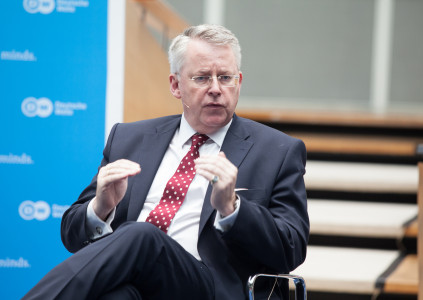By Emnet Assefa
Photos by Alison Klein
In today’s digital world where news travels fast, the global broadcasting industry has seen several transforming changes.
In the heart of this transformation is the expansion of international broadcasters whose coverage has increased over time, reaching now almost half of the world’s population.
Several new content distributors have joined the game increasing their influence in the industry. Technology giants such as Google and Facebook have facilitated this transformation both in the production and distribution ends of the spectrum. Following these changes and transformation over the past few years, it is interesting to see where the international broadcasting is headed to and which role will the international broadcasters take in promoting democratic values.
Many international broadcasters agree that the collaboration between new distribution platforms, local broadcasters, and network providers will become a rule inside the industry. One of the people who is optimistic about these collaborations is Peter Limbourg, General Director of Deutsche Welle.
“The benefit collaborations between new distribution platforms and international broadcasting is mutual. They need content and we need better and advanced digital distribution methods. They should not be seen as the enemies rather as partners,” he said.
According to him, collaborations between local media establishments will be used to expand the coverage of these international broadcasters. DW recently announced a collaboration with a Nigerian environmental magazine, Eco@Africa, to support the production of contents on environmental protection issues.
John F. Lansing, CEO and Director of Broadcasting Board of Governors, a corporation that operates Voice of America said that besides expanding coverage, partnering with local broadcasters has a great role of promoting investigative and interactive journalism.
He noted that various journalistic institutions have impact big enough to be recognized by governments who then fund these broadcasters.
The other trend that is mostly seen in the broadcasting world is the digitalization of the industry. Several technology initiatives are being introduced to the industry. Most of these publicly funded international broadcasters have to go in that path of digitalization in order to stay in the market.
“We have to go where the listeners are, so we are now on the Internet, we are also on mobile apps,” said Cécile Mégie, Director of Radio France International, RFI. She also noted that the costs of getting digital are high and impact is an important factor in securing funding.
Growing incidents related to global concerns such as terrorism and refugee crisis were also seen as reasons for increasing the popularity of international broadcasters among local audience. International broadcasters like Deutsche Welle, for example, had an increased number of the local audience during the refugee crisis following the arrival of thousands of refugees to Germany.
All in all, international broadcasters are optimistic about the future. “The international broadcasting is becoming more digital and collaboration will be a greater part of it,” noted Peter Limbourg.




